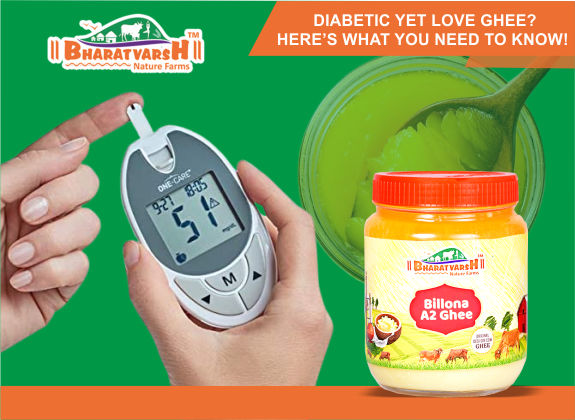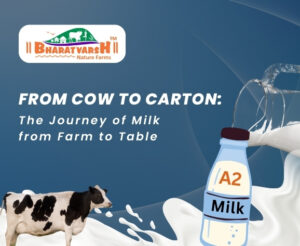Diabetes type 1 or type 2 affects around 30 million individuals in India, with an urban Crude Prevalence Rate (CPR) of close to 10% and an Impaired Glucose Tolerance (IGT) of approximately 9%. Controlling one’s diet is very important step towards control of sugar,when it comes to diabetes.
Diabetes is difficult to manage since it causes you to rethink all your eating choices.Newer habits need to be established, with different foods and limits,to support health that does not negatively impact blood sugar levels. Fixing a new diet and routine may be difficult especially when you are a food lover.So we are here today to address a typical question – “Is Ghee Good for Diabetics?”. Research suggests that eating ghee when diabetic is crucial.We will discuss the advantages, nutrition, daily constraints, and everything about diabetes and ghee.
Is ghee good for Diabetics?
One of the common misunderstandings about diabetic diets is that desi ghee is toxic and should be avoided. Controversy about oils and ghee by diabetics has been ongoing for some time. According to dieticians, in truth the Diabetics should consume ghee, and dietitians recommend regular consumption of ghee in tiny quantities.
Ghee, has been shown to help manage blood sugar levels because the fatty acids assist in glucose metabolism.Ghee is high in linolenic acid, lowering the risk of developing cardiovascular disease. Another advantage of consuming ghee is that it promotes a healthy and smooth digestive system. The vitamins present in Ghee (A, D, and K), butyric acid and antioxidants aid in enhancing immunity, which is often impaired in diabetics.
Benefits and Health Effects of Ghee for Diabetics
Here are some of the reported benefits of cow ghee that promote health benefits for the diabetic patients:
- Low carbohydrate
Ghee is high in fat and low in carbs. People with diabetes should avoid consuming carbohydrates. As a result, ghee is an excellent substitute in diabetic diet that contains various other beneficial elements.
- Influence on Better Digestion
The addition of ghee to other meals has a significant influence on digestion. Adding ghee to rice, for example, makes it simpler to digest. It is quite beneficial, particularly for diabetic individuals.
- Beneficial In Boosting Improved Insulin Secretion
Ghee is also beneficial in increasing insulin secretion in the body, which is a necessary hormone for diabetes management. Ghee helps improve the functioning of GLP 1, a vital gut hormone,that stimulates insulin secretion.
- Assists in lowering the Glycemic Index (GI) of foods
Aside from making things simpler to digest, ghee also helps lower the Glycemic Indexof foods. It may be spread over and added to paratha, rice, dals and other dishes, whichhelps delay the absorption of carbohydrates and prevents gastric secretion.As a result, the person feels full for a longer period of time and the Glycemic Index of food lowers. Overall, there are lesser chance of increased blood sugar levels, which make the ghee added food more suitable for diabetic individuals.
- Vitamin K in Large Amounts
Ghee contains a lot of vitamin K. This vitamin, coupled with fatty acids, is highly effective in encouraging meal absorption. Ghee, therefore, promotes improved metabolic response to sweets and aids in managing blood glucose levels.
Nutritional Facts about Ghee
According to researcharticle published in the Journal of Food Research and Technology in the year 2014, ghee predominantly contains fat, and is high in short-chain fatty acids or essential fatty acids such as linolenic acid and arachidonic acid. Ghee also includes fat-soluble vitamins such as A, D, E, and K and trace minerals such as copper, iron, and carotenoids. Let’s have a look at the nutritional contents for ghee:
- Carbohydrates
Ghee has no carbs since it is virtually entirely fat. One tablespoon contains 15 g of fat, and out of which 9 g is saturated fat.
- Protein
If the milk solids (whey) are not entirely removed during the clarifying process, ghee may include trace protein levels.
- Minerals and vitamins
The micronutrient content of Ghee varies depending on the brand and the diet of cowsthat produce its milk. A one-tablespoon portion typically includes:
- About 8% of the recommended daily intake (RDI) of vitamin A.
- 2% of the RDA of vitamin E.
- 1% of the RDA of vitamin K.
Bharatvarsh Nature Farms produces exceptionally pure A2 ghee from the milk of indigenous breed of cows, which are organically fed on the fodder produced on farm or nearby forest area.
So how much ghee should you eat?
We must remember that consuming excessive ghee may lead to various health problems and diseases. However, if used in moderation or within certain restrictions, it may do wonders for your health.
According to nutritionists, 50% of the total visible fat limit consumed as ghee. The amount of ghee that you may consume in a day is as follows:
- Males and women: 2 tsp per day
- 3 tsp/day for pregnant and breastfeeding women
- Infants aged 0-6 months (only breast milk)
- 7-24 months: 2-3 teaspoons each day
- Children (3–9 years): 2-3 teaspoons per day
- 3tsp/day for adolescents (10-17 years old).
Please remember that the suggestions above do not account for people with various illness conditions.
To promote simple digestion, never add more than a teaspoon of ghee to dal and rice or any other high carbohydrate dish. You can consider to replace ghee instead of other cooking oils in regular cooking to obtain the most advantages. However, overeating will negate the benefits of cow ghee. Also speak with your doctor before including it into your diet,
Conclusion
Considering the importance of maintaining blood sugar levels in diabetics, the diet and food choices need adjustment. A diabetes patient should also be careful about the quantity of ghee consumed on a daily basis.Even though ghee contains lot of fats, it has earned the approval of many health experts in diabetes. Because of many vital minerals present that may promote health in people with diabetes, Ghee has long been used as a therapeutic component in diabetic patients.
Bharatvarsh Nature Farms produces pure A2 Cow Ghee using vedic method of churning the curd from the indigenous cows at the farms.Our Ghee is prepared with minimal processing that helps in preserving its natural nutrients. You can visit our farm at Virly village close to Umred for the purchase of A2 Ghee or various high-quality food dairy products produced at our farm.
For more details, please visit our website: https://bharatvarshnaturefarms.com/
Get in touch with us for any further information about products from Bharatvarsh.
Write to us at: info@bharatvarshnaturefarms.com
Call us at: 91-8603214214, 8650214214




